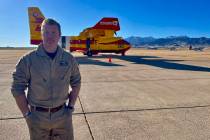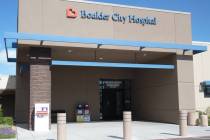Staff trained to handle myriad emergencies
What is the Emergency Medical Services system? I am frequently asked: What exactly do you do as a paramedic? Do you fight fires and run medical calls? What happens when there are multiple calls or a fire and a medical call at the same time? What happens when you take someone to the hospital?
These questions and many more are asked of Boulder City firefighters on a daily basis.
The EMS system, in general, is a well-developed system of running emergency medical calls, and involves all personnel, equipment and supplies needed to handle any given situation, including dispatch officers, police officers, firefighter/paramedics, nurses and doctors. Each person or piece of equipment is designated for specific needs and is ready to respond on any given emergency.
In a time of an emergency, be it medical, hazmat or fire related, the way to initiate the EMS system and ask for help is by contacting a 911 emergency dispatcher. The emergency dispatcher is trained to ask appropriate questions related to the emergency.
The dispatcher then alerts the police and medical responders by paging out the call through our 800-megahertz telecommunication system. This system allows the firefighters and police officers to be notified of an emergency at the station or through our hand-held radios when we are out of the firehouse. The emergency dispatchers then relay all the pertinent information regarding the location and nature of the emergency.
These dispatchers are trained to stay on the line and help assist the patient until emergency responders arrive. During the call dispatchers also are responsible for updating any pertinent information and contacting any additional resources needed for the call, such as police assistance, additional ambulance rescues or an air ambulance.
Once on scene, the firefighters and paramedics become the initial responders for the emergency. The firefighters are trained to the emergency level of paramedics and emergency medical technicians-advanced. Paramedics will begin the patient care as soon as possible.
Paramedics are trained in stabilizing the patient and taking the patient to where the most appropriate level of care can be provided. Paramedics are trained to provide initial life-saving measures, including appropriate drug treatments. Paramedics are well-trained across the board to help with any emergency possible and are trained to make quick decisions and maintain patient care through transfer at a local hospital.
Once a patient is at the hospital, the EMS system is taken over, in part, by the hospital emergency room staff. Certified nursing assistants, nurses, doctors and specialists all play in role in continuing and maintaining patient care. Each staff member in the emergency room plays a specific role in the overall well-being of the patient.
Paramedics give a summary of the patient’s condition as well as any interventions or medications given en route to the hospital. Once the patient has been transferred to the hospital staff, care will continue until the patient is healthy enough to go home. If a specialist of any kind is required to maintain patient care, then the on-duty hospital staff will refer the patient to the most appropriate doctor or facility.
It is the goal of the EMS system to provide fast and efficient care to all patients.
Since patient care is continued through the initial 911 dispatch through the transfer and treatment provided at the hospital, we maintain a well-rounded working relationship with each other to provide the optimal care to our patients. The EMS system is designed to help make patient care run as quickly and fluently as possible.
If you have questions regarding the EMS system, how it works or the jobs of those directly involved, contact me at the fire station at 702-293-9228, or email me at bshea@bcnv.org.
Brian Shea is a Boulder City paramedic/firefighter.











